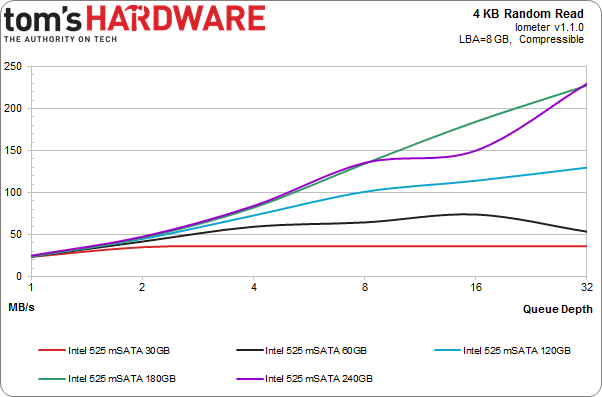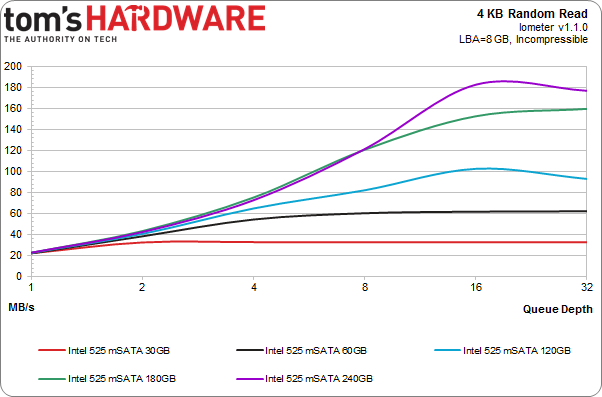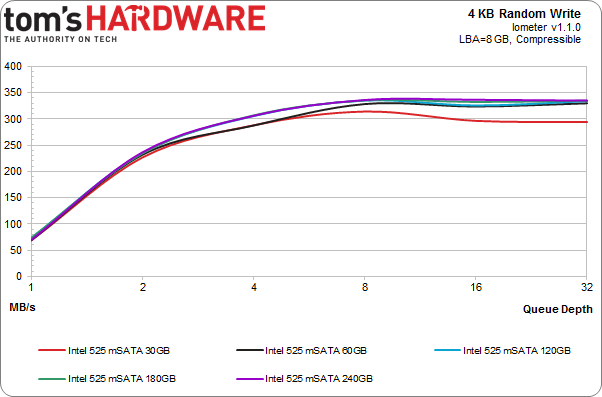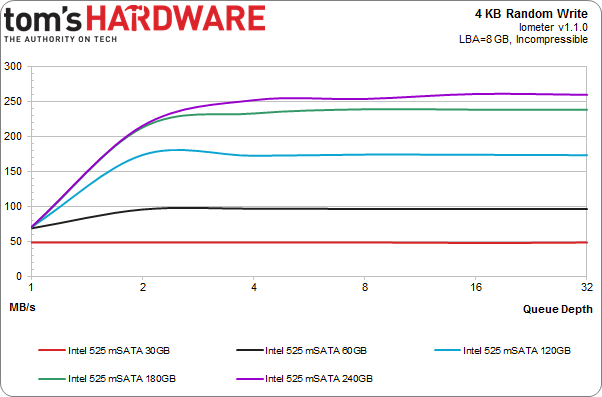Intel SSD 525 Review: Five mSATA Drives, From 30 To 240 GB
Intel has a new family of mSATA-based SSDs powered by SandForce's second-gen controller. Dubbed the SSD 525, we have all five capacities in our lab. Can the promise of strong performance, 5,000 P/E cycles, and a five-year warranty make up for high prices?
Results: 4 KB Random Performance
Why you can trust Tom's Hardware
Random Read Performance
Random 4 KB read performance is mixed among Intel's new drives. There are lot of newer SSDs out there able to trounce even the 240 GB SSD 525. Not even compressible data helps put the SandForce-based mSATA drives in a special place. Fortunately for Intel, the reality of most client-oriented storage solutions is that they won't see a lot of constant high-queue depth random I/O.
Between the capacities, results at a queue depth of one are constant at around 24 MB/s. Why are they all going that fast? Performance at those settings is governed almost exclusively by the flash, and even drives with different controllers perform the same when they utilize the same NAND. As more requests stack up, the controller, memory, firmware, and flash translation layer all come into play.
Not much changes when we switch to random data. The advantage attributable to moving compressible information isn't as pronounced when the access pattern is random, so the consequences aren't as severe when that advantage is lost. As the queue depth depth increases, larger SSDs do benefit, though. The 60 and 30 GB models are once again left in an unenviable position: slow and slower.
Random Write Performance
The smallest SSD 525 can even reach 300 MB/s with 4 KB random writes using repeating data. The other four models bunch up under 350 MB/s, hitting an overhead-induced bottleneck.
Testing with random 4 KB data looks a lot like the sequential workload on the previous page. Aside from the two smallest capacities, the 120, 180, and 240 SSD 525s continue punching above their weight.
The 180 and 240 GB models are neck and neck, just over and below 250 MB/s. The 30 GB drive still can't get over the 50 MB/s hurdle, while the 60 GB versions stalls at the 100 MB/s mark.
Current page: Results: 4 KB Random Performance
Prev Page Results: 128 KB Sequential Performance Next Page Results: Comparative 4 KB Random PerformanceGet Tom's Hardware's best news and in-depth reviews, straight to your inbox.
-
hero1 Nice article. I would like to see more motherboard makers finding a way to include the mSATA slots right on the board like Gigabyte does. I think the ability to have your OS and programs on mSATA and leave the other SSD for games and storage is very welcome. This will be my next hunt, too bad I got rid of my UD5H because it had mSATA slot. I would like to see such feature in the X99/X89 platform.Reply -
slomo4sho The 250 GB Samsung 840 still seems to be the best buy when evaluating price per performance as it is frequently offered at around $.60 or less per GB.Reply -
abbadon_34 damn site changes, no edit.Reply
Interesting, if some benches weren't Intel only, but all included the relavent competitors. -
dthx damianrobertjonesIt is REALLY unfair to reduce the performance of smaller GB drives!This is not something manufacturers do to just to p*ss off users who buy the smaller capacities.Reply
A small drive has fewer memory chips than a large drive. The controller has then fewer chips to efficiently spread the data to... and this leads to decreased performances. There's nothing immoral to that.
It's not the same story like for example, a couple of years ago, Yamaha selling a 2x CD writer and a 4x CD writer at double the price ... and by removing one resistance, your 2x writer became a 4x model ;-) -
mapesdhs slomo4shoThe 250 GB Samsung 840 still seems to be the best buy whenReply
evaluating price per performance as it is frequently offered at around $.60 or less per GB.
It's a surprisingly good drive, and performs very well on boards that only have SATA2.
I recently upgraded my brother's P55 system with an 840 250GB; the main game he
plays atm now loads in just a few seconds, instead of the more than 3 minutes it took
with the old mechanical disk (and that wasn't exactly a low-end drive either - a WD VR
150GB 10K SATA). He is, as one might expect, very happy indeed.
In addition, I bought him an internal Startech storage unit that holds 4 x 2.5" devices
(it takes up one 5.25" bay) and a couple of 2.5" drives (1TB for general data, 2nd-hand
250GB for backup of the 840). He bought another 1TB for backup, so the Startech now
holds the 840, two 1TB and the 250GB. The end results looks rather good, and the
performance with the 840 is excellent (I bought one for my 3930K setup).
I have a lot of OCZ drives (more than 40, various models); what impresses me the most
about the 840 is the way it maintains top performance even after being hammered with
an 80GB full clone from an old disk, lots of Windows and driver updates, game installs, etc.
Testing with HDTach, AS-SSD, etc. show performance almost identical to an original clean
state. None of my OCZ drives behave this way - the HDTach graph shows significant
variance, while the 840 graph is smooth across the range. Beats me how Samsung has
achieved this, but I like it.
Modern SSDs may be saturating the SATA3 interface, but they bring an amazing new lease
of life to older SATA2 systems.
Ian.
-
ddpruitt The vast majority of mSATA systems use the SSD as a cache, and then it's only Intel systems. I would like to see the mSATA ports be more flexible and offered on a larger variety of systems. I'd love to upgrade the mSATA on my laptop but there's no point, I already use an SSD for the main drive. Turning an mSATA into a usable drive on the system is a PITA and just not worth it.Reply -
Onus I have an Asus Maximus Gene V which has a mSATA slot on a little riser card. I am using a 238GB-usable Crucial M4 there as my system drive. It's been working well, so I have no complaints.Reply
I have an ASRock Z77E-ITX back from RMA that I haven't yet put back into service that has a mSATA slot on its underside. It can be used to build a very small system. That these slots are only 3Gb/s hardly matters when comparing them to the speed of a mechanical HDD.



